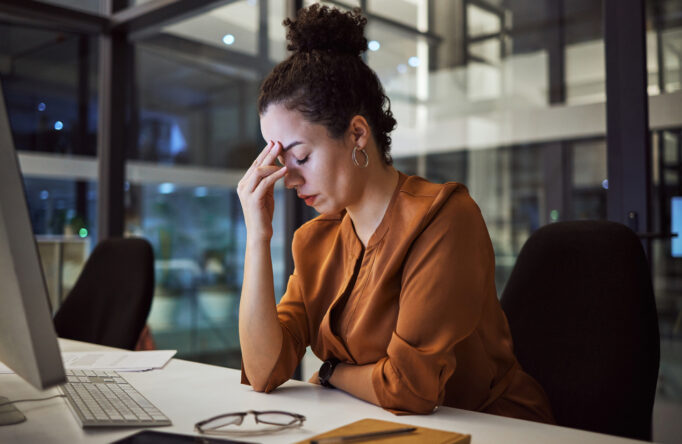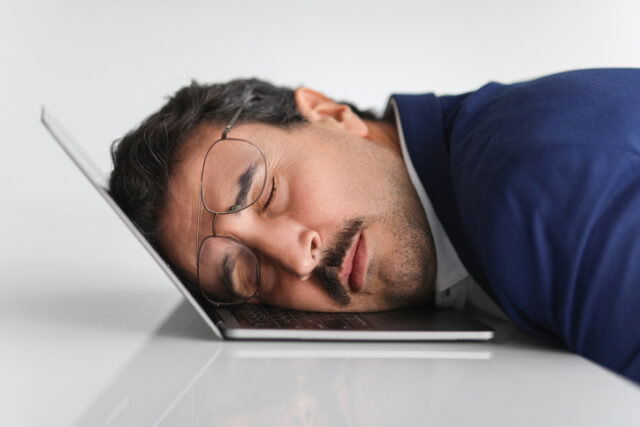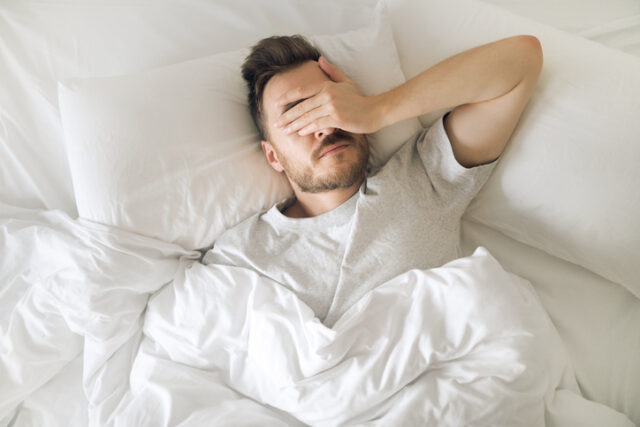Waking up feeling exhausted is one thing, but when you’re already drained by noon, even after a full night’s sleep, it starts to feel like something’s seriously off.

You might assume you just need more rest, but the frustrating part is that extra sleep doesn’t always fix the problem. Instead, you end up trapped in a cycle of feeling sluggish, reaching for caffeine, and daydreaming about crawling back into bed. If this sounds familiar, you might be dealing with something called “Back to Bed Syndrome.” Here’s why it happens and what’s really making you feel so wiped out by midday.
1. Your sleep quality isn’t as good as you think.

Getting a full eight hours doesn’t always mean you’re actually well-rested. Poor-quality sleep where you’re constantly waking up, tossing and turning, or not reaching deep sleep leaves you feeling just as exhausted as if you hadn’t slept at all. You might technically be in bed for long enough, but your body isn’t getting the restorative rest it needs. Sleep interruptions, uncomfortable temperatures, or even too much light in the room can all mess with sleep cycles. If you’re waking up feeling groggy and desperate for more rest, it’s worth checking whether your sleep is actually solid or just long.
2. Your morning routine sets the wrong tone for the day.

What you do first thing in the morning can make or break your energy levels. Rolling straight out of bed and into work, scrolling through your phone, or skipping breakfast can leave you feeling sluggish before you’ve even properly started your day. If your mornings feel rushed or unstructured, your energy never really gets a chance to build. Even something as simple as getting some sunlight, stretching for a few minutes, or eating something nutritious can make a difference. The goal isn’t to create some rigid, “perfect” morning routine, just to start the day in a way that helps rather than drains you.
3. You rely too much on caffeine to stay awake.

That first cup of coffee might feel like a lifesaver, but if you’re using caffeine to push through constant exhaustion, it can backfire. Drinking too much too early in the day causes an energy crash later on, leaving you feeling worse than before. It tricks your body into staying alert for a while, but once it wears off, you end up even more drained. If you’re crashing by noon, it might be worth spacing out your caffeine or reducing how much you drink. Reaching for water, protein, or a short break instead of another coffee can help avoid the midday slump.
4. You don’t move enough in the morning.

Sitting too much, especially early in the day, can make your body feel more sluggish than it actually is. If you go from bed to desk without moving much, your energy never really kicks in. Even a quick stretch or a short walk in the morning can get your blood flowing and wake up your brain properly. You don’t need an intense workout to feel the difference, either. Just breaking the cycle of lying down, sitting, and slouching first thing can stop your body from thinking it’s still in rest mode.
5. Your body is running on stress, not actual energy.

High stress levels trick your body into feeling wired but tired. You might get through the morning running on adrenaline, only to hit a wall around lunchtime when your body finally catches up. If you’re constantly on edge, overwhelmed, or mentally drained by noon, stress might be sucking up more energy than you realise. Even if you can’t eliminate stress completely, small things like stepping away from screens, taking deep breaths, or setting small breaks during the morning can stop your body from burning out too early in the day.
6. Your diet is setting you up for a crash.

What you eat in the morning plays a huge role in how long your energy lasts. Relying on sugary cereals, pastries, or skipping food altogether means your body burns through energy too fast, leaving you feeling sluggish before midday. Carbs without protein or healthy fats can spike your energy for a short time, then drop it just as quickly. Balancing your breakfast with protein, fibre, and healthy fats helps keep energy stable for longer. If you’re tired of crashing early, switching up your first meal of the day might make a bigger difference than you’d expect.
7. You’re spending too much time in artificial light.

Sunlight plays a huge role in regulating your energy, but many people spend their mornings under artificial lights that don’t give the same boost. If you go straight from waking up to sitting under dim or fluorescent lighting, your body might not fully register that it’s daytime yet. Getting some natural light in the morning, even just by sitting near a window or stepping outside for a few minutes, can help your brain wake up properly and reduce the need for extra naps later.
8. You’re mentally drained before the day really starts.

Burnout doesn’t just come from physical exhaustion; it happens when your brain is overloaded too early. If your mornings are packed with decision-making, problem-solving, or stressful work, it’s no surprise you’re ready to crash by lunchtime. Saving the most mentally draining tasks for later in the day or giving yourself a mental break between tasks can help preserve energy. Pushing too hard too early just leaves you wiped out before you even get halfway through the day.
9. Your hydration levels are too low.

Dehydration is one of the easiest ways to feel tired without realising why. Even mild dehydration can cause fatigue, headaches, and sluggishness. If your first drink of the day is coffee instead of water, you’re probably not giving your body what it actually needs. Drinking a glass of water first thing in the morning (before caffeine) and keeping a bottle nearby throughout the day can help avoid those random waves of exhaustion.
10. You’ve conditioned your body to expect midday naps.

If you always feel exhausted by noon, it might not just be random. It could be a pattern your body has learned. If you regularly take naps or crash around the same time, your body might be adjusting its energy cycles to match that expectation. Breaking the cycle by pushing through the slump (without caffeine) or adjusting your sleep schedule slightly can help retrain your body to stay alert for longer.
11. You’re scrolling too much first thing in the morning.

Starting the day glued to a screen, especially social media, can overload your brain before it’s even fully awake. The flood of information, notifications, and comparison triggers stress and decision fatigue before you’ve even stepped out of bed. Giving yourself a phone-free start to the morning, even just for the first 20 minutes, can help prevent an early energy drain.
12. Your sleep schedule is inconsistent.

Going to bed and waking up at random times confuses your body’s internal clock. Even if you’re getting enough sleep, constantly shifting your bedtime or wake-up time makes it harder for your body to maintain steady energy throughout the day. Sticking to a more regular sleep schedule, even on weekends, helps keep your energy levels predictable instead of crashing at random times.
13. You’re expecting exhaustion, so it happens.

Sometimes, just expecting to be tired makes you feel even worse. If you’ve convinced yourself that you’ll be drained by noon no matter what, your brain will find ways to reinforce that belief. It’s a cycle that keeps repeating because you’ve trained yourself to anticipate it. Changing the way you think, even slightly, can help break that pattern. Instead of assuming you’ll be exhausted, focusing on small changes to improve energy levels can make a bigger difference than you’d think.




